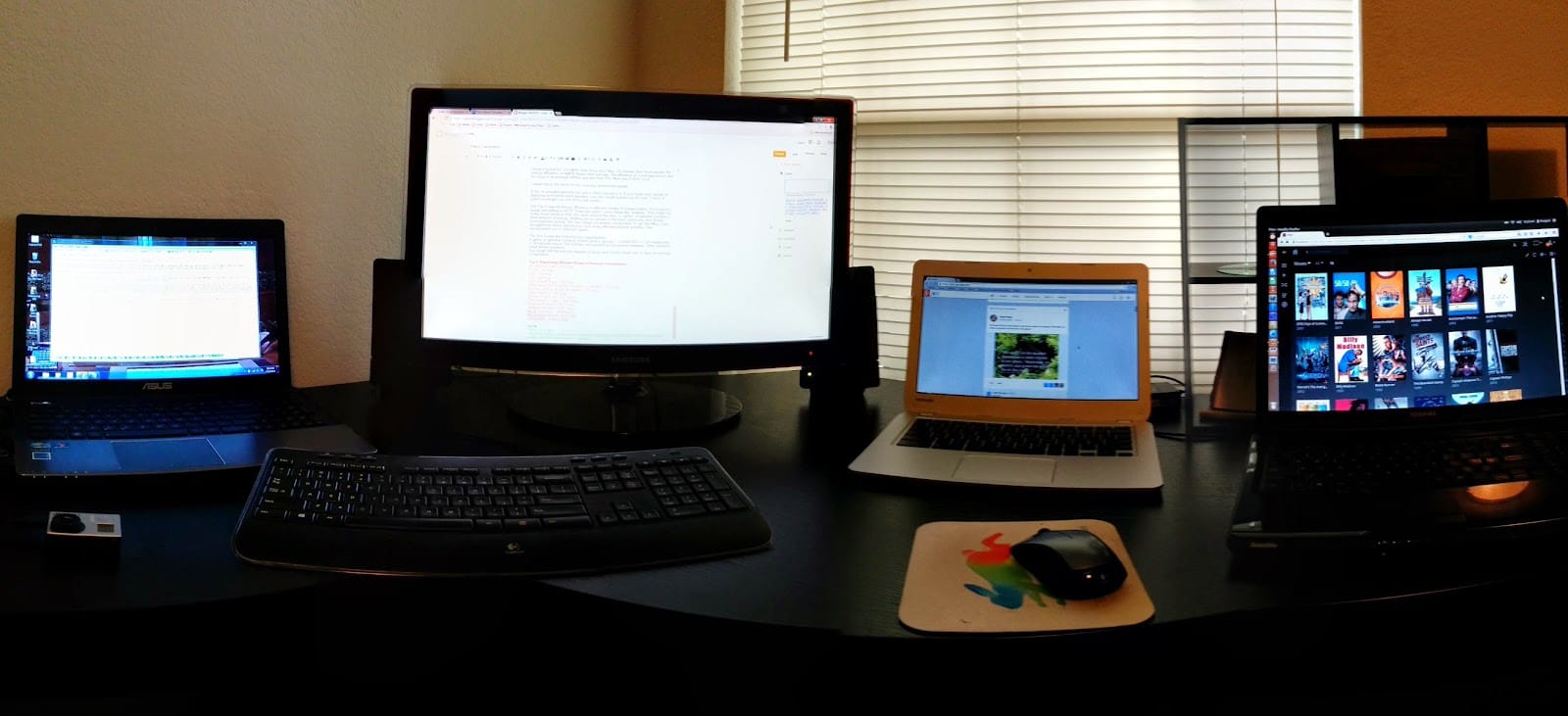Motto: Open is as Open Does
This Column is about computer stuff. It is going to have not 1, not 2, not 6, but 5 Top 5’s. I own three laptops:
- A 6 year old dinosaur which was unearthed and given new life like Frankenstein’s monster by way of Ubuntu 12.04 (Linux). I use this machine as a media server.
- A 3 year old machine running Windows 7. It was what you’d consider “my only computer” for quite some time… but nowadays I only really use it for media editing and file management.
- A 6 month old Chromebook that I use the most often. It’s my fastest browser.
That’s what I do have. It’s not what I’d like to have. What I’d LIKE to have is a monster desktop machine on which I store all my files, perform all my video & media work, manage all my devices, and maybe even play some games. I’d like to use it kind of like a personal cloud for Melissa and myself. Then we could do most of our daily computing on lightweight reach devices - each tying in to our main storage repository. I could easily do that… but it would take money. Then what would I do with laptops 1 & 2? So, I’m going to do the rare thing and make due with what I have. I’m running out of storage space, though. Also, “what I have” is still a Microsoft product, and I long ago decided to abandon their platform as soon as was convenient. I’d like to go full-blown Linux… but that’s easier said than done. It’s a big of a double-edged sword. Top 5: Pros of going Linux-Only5. Linux is free. Almost everything about Linux is free to install and play around with. 4. You can customize everything about everything, just to your liking. 3. Most everything you’d like to do on a computer, you can find an Open Source, free version of. Want to Photoshop something? Try GIMP. It’s free! 2. Using Linux makes you a smarter, more computer-savy person. 1. Linux can be super dooper fast. You can blaze through a workflow for almost anything you want to do in a very expedient manner. You can easily create scripts to automate stuff. If you’re a developer Top 5: Cons of going Linux-Only5. Linux is free. Money is a strong motivating factor for developers and, as such, many Linux distros are unstable when compared to Apple or Microsoft’s operating systems. 4. You can customize everything about everything, and get stuff really really hopelessly screwed up. 3. Most everything you’d like to do on a computer, you will have a slightly more cumbersome time accomplishing with Open Source software. Proprietary solutions tend to be more streamlined and capable than Open Source ones… see #5 of this Top 5 for the reason. 2. Using Linux FORCES you to be a smarter, more computer-savy person because it’s challenging in every corner. 1. Linux can be super dooper fast if you put in the work to make it that way. If you don’t know what you are doing, it’s super dooper slow. If you know how to run a Windows machine, you may have trouble picking up a Macintosh. Each Linux distro comes with its own learning curve. So. That’s something I’ve been thinking about. I’ve also been considering my dependence upon “the Cloud”. First off, what is “the Cloud”. Long story short, the Cloud is a computer that your computer uses to do some function. That function could be data storage, heavy computing, or any other sort of thing. I use Google as my Cloud solution provider, but each of the following bullets could be applied to any cloud service. **Top 5: Pros of life in “the Cloud”:**5. If my laptop decides to perform a murder-suicide on my external hard drive, I won’t lose all of my stuff. 4. I can access and manipulate any & all of my stuff from my phone, tablet, or Chromebook on the road without any foresight required. 3. Google can manipulate my stuff for me - making it better. 2. You can harness the power of a supercomputer cluster from a low-powered client device. 1. It’s magic. **Top 5: Cons of life in “the Cloud”:**5. If Google all the sudden closed their doors, or just shut down the Drive product, I would lose everything I didn’t have saved locally. 4. If Google decided I was breaking their terms of service, they could shut me off from all my stuff. 3. I have no way of knowing if somebody sitting in a datacenter somewhere can/is snooping on all of my stuff. 2. I have no way of knowing if somebody sitting anywhere along the path from my computer to that datacenter can/is snooping on all of my stuff. 1. Nobody understands the Cloud Basically, “the Cloud” is ephemeral in nature, depends on factors outside of your control, and comes with inherent privacy risks. Local software can runnable forever. Local storage is permanent (barring hardware failure, theft, or some other catastrophe). Local software & storage is less prone to privacy concerns. Local stuff is within your control. I use KeePass instead of LastPass because I don’t like the idea of storing my passwords in “the Cloud”. I DO use the Cloud for backup of all my photos, documents, music, and finished home videos. I’m still deciding just how comfortable I am with that. I’m going to end my discussion of computer stuff by just saying a bunch of Linux-related buzzwords. Command CLI GNU BASH targz kernal flags linux environment Ubuntu packages makefile distro user compression SUDO script FAT32 GNOME Unity GIMP SQL partition permissions Intel Mir directory repository Python. Top 5: Possible Directions I’ve Seriously Considered Going5. Stop and turn on a dime, throw away everything including my phone and start over with all Apple products. 4. Keep all my current hardware, buy a terabyte of Google Drive space and move everything to it. 3. Keep all my current hardware, buy a Network Attached Storage device (NAS) and make my own personal cloud. 2. Get rid of my non-Chromebook laptops and build a custom desktop computer running one of two Linux distros. 1. Keep all my current hardware, maybe make it dual boot to Linux, and buy another external hard drive. The least fancy option and the one I’m probably going with.
Quote:
“Sudo make me a sandwich”
- XKCD and Google Voice Search -

